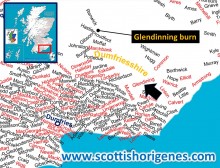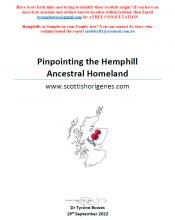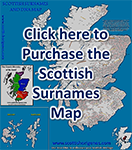You are here
No DNA? No Problem! (October 2022)
 Research at Scottish Origenes has revealed that about 20% of Scottish surnames are exclusive to a single location within Scotland. Since Scottish surnames are often a genealogical record of one’s ancestor (Mac’ = son of) it means that each of those unique Scottish surnames had a single founding male ancestor, the first for example to take (for example) the ‘Glendining’ surname. That Glendinnig-Adam lived in a specific part of Scotland, and today science has revealed that 50% of males named Glendinning will be directly descended from that Glendinning founding ancestor (Glendinning-Adam). In addition, Scotland is rich in placenames that are associate with surnames. For example, the ‘Glendinning’ surname is exclusive to Dumfriesshire in Southern Scotland and farmers named Glendinning still farm the lands close to 'Glendinning burn.'
Research at Scottish Origenes has revealed that about 20% of Scottish surnames are exclusive to a single location within Scotland. Since Scottish surnames are often a genealogical record of one’s ancestor (Mac’ = son of) it means that each of those unique Scottish surnames had a single founding male ancestor, the first for example to take (for example) the ‘Glendining’ surname. That Glendinnig-Adam lived in a specific part of Scotland, and today science has revealed that 50% of males named Glendinning will be directly descended from that Glendinning founding ancestor (Glendinning-Adam). In addition, Scotland is rich in placenames that are associate with surnames. For example, the ‘Glendinning’ surname is exclusive to Dumfriesshire in Southern Scotland and farmers named Glendinning still farm the lands close to 'Glendinning burn.'  So even without DNA test results one can link one’s ancestors back to a specific Scottish location (all Glendinnings will have an ancestral papertrail that will ultimately lead back to Glendinning burn). You can explore the Scottish Origenes Maps online for FREE click here.
So even without DNA test results one can link one’s ancestors back to a specific Scottish location (all Glendinnings will have an ancestral papertrail that will ultimately lead back to Glendinning burn). You can explore the Scottish Origenes Maps online for FREE click here.
 For those with Scots Irish origins, your ancestors arrived in Ireland among tight knit family groups that left parts of Southern and Western Scotland to settle throughout Ireland (as illustrated on the first ever Plantation Surnames of Ireland map click here). Research at Irish, Scottish, and English Origenes has revealed that the Plantation surnames in each area of Ireland mirror those of their Scottish or English origin. To identify the ultimate Scottish origin of your Scots Irish ancestors all Scottish/Irish Origenes requires is your ancestral surname and an earliest known location within Ireland. This is beautifully illustrated in Scottish Origenes examination of the Scots Irish 'Hemphills’ of Cookstown in County Tyrone in Ulster in Northern Ireland. You can read the Scots Irish Hemphill Surname study by clicking here. If you have an earliest known location for your Scots Irish ancestors but want to discover their ultimate Scottish origin, then email tyronebowes@gmail.com or contact Scottish Origenes for a FREE consultation click here.
For those with Scots Irish origins, your ancestors arrived in Ireland among tight knit family groups that left parts of Southern and Western Scotland to settle throughout Ireland (as illustrated on the first ever Plantation Surnames of Ireland map click here). Research at Irish, Scottish, and English Origenes has revealed that the Plantation surnames in each area of Ireland mirror those of their Scottish or English origin. To identify the ultimate Scottish origin of your Scots Irish ancestors all Scottish/Irish Origenes requires is your ancestral surname and an earliest known location within Ireland. This is beautifully illustrated in Scottish Origenes examination of the Scots Irish 'Hemphills’ of Cookstown in County Tyrone in Ulster in Northern Ireland. You can read the Scots Irish Hemphill Surname study by clicking here. If you have an earliest known location for your Scots Irish ancestors but want to discover their ultimate Scottish origin, then email tyronebowes@gmail.com or contact Scottish Origenes for a FREE consultation click here.
Commercial DNA testing is still an immensely powerful research tool, and I would always encourage people to participate in commercial ancestral testing. If you want to find out about a suitable DNA test for you or want a FREE consultation on your DNA test results, then email me tyronebowes@gmail.com or contact Scottish Origenes click here. There is no deep dark secret to Scottish Origenes analytical technique, many DNA Case Studies are free to view online (click here) and all the Origenes maps are FREE to browse online click here. What will your surname or your DNA reveal?
He who can, does. He who cannot, teaches (Irish playwright George Bernard Shaw,1903)






